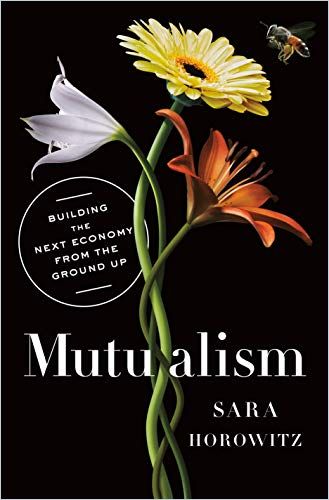MacArthur fellow Sara Horowitz offers a workable, actionable blueprint for creating and sustaining nonprofit organizations that fulfill societal needs.

Community Collaboration
Founder of the Freelancers Union Sara Horowitz – former chair of the board of the Federal Reserve Bank of New York and a MacArthur fellow – details how the US economy has become starkly Darwinian. Her antidote: “mutualism” – creating organizations that meet societal needs rather than seeking profits. Horowitz established the Freelancers Union to provide bargaining power and legal safeguards to independent contractors. She makes a compelling case that mutualism can fill the gaps in modern social safety nets and empower workers and communities.
Mutualism
Mutualism has long been a part of human societies. Religious groups, cooperatives, unions, communes and kibbutzes are all examples of mutualism in action. Mutualist groups exist to foster self-help.
We need mutualism now more than ever.Sara Horowitz
In 1995, Horowitz launched the Freelancers Union, which created a safety net for independent contractors by providing members with health insurance and a nationwide network of service providers. It also fought freelancer wage theft.
The New Deal
President Franklin D. Roosevelt endeavored to create a nationwide safety in the United States. His New Deal reforms included Social Security, unemployment insurance and a minimum wage. Risk shifted from American workers onto employers and the government.
Horowitz’s grandfather was a leader of the International Ladies’ Garment Workers’ Union (ILGWU), a mutualist effort to protect low-wage workers against the risks that their employers sought to offload on them. The ILGWU set up housing cooperatives, health clinics and credit unions, and it brought economic power to workers.
The collapse of the safety net was no accident. It was the result of neglect on the left and sabotage on the right. Sara Horowitz
After the 1930s, the protections of the New Deal’s social safety net eroded; pushback from the political right weakened the social contract. Economists like Milton Friedman portrayed a meddlesome government as a drag on economic growth. As the right embarked on tax cutting and deregulation, the left leaned on government as the answer to societal ills. And as factories closed and American politics changed, unions lost their luster: In 1955, 35% of Americans had belonged to unions, but by 2019, that share had plunged to 10%. So by 1981, when President Ronald Reagan fired 11,000 striking air traffic controllers, his actions provoked scant protests. By the 1990s, sick time, vacation days and employer-sponsored retirement plans and health coverage were dwindling.
Ecosystems
Horowitz points out that mutualism is part of biology: Plants, for instance, receive sustenance from underground webs of fungi, and flowers rely on bees for pollination. As humanity urbanized, mutualism remained a powerful force. For example, early Dutch society survived because local farmers constructed networks of dikes and canals, and local water boards bound together farmers who couldn’t stop the rising waters by themselves.
Mutualism isn’t socialism or communism. Those systems are top-down regimes that centralize decision making and power. Mutualism is a bottom-up ethos that takes the needs of communities into account and allows them to create unique, local solutions.
Social Purpose
Mutualist entities solve problems for a “community of interest.” Members of the mutualist group can share a trade, a skill or a location, as do, for example, food co-ops.
Mutualist organizations are built on trust, not fear. They are about building, not tearing down.Sara Horowitz
Mutualist groups often organize along racial, cultural or religious lines. Black churches and co-ops help the Black community cope with racial oppression. In the early 1900s, trade unions often represented Jewish workers. Today, immigrants continue to form mutualist entities.
Economically Self-Sustaining
Mutualist organizations need to pay the bills. Food co-ops, for example, generate revenue from selling food and collecting membership fees; their members volunteer in the stores. The Freelancers Union earns by acting as an insurance broker.
A mutualist organization needs to have money coming in, and it needs to have more money coming in than it has going out.Sara Horowitz
Mutualist revenue streams must be reliable and independent of any backer or benefactor. The community of interest must value the group and its service enough to pay for it or offer its volunteer expertise.
The Long Term
According to the Iroquois Confederacy, a sound decision benefits not just today’s people but also those seven generations into the future. This position is the absolute opposite of the short-term, shareholder-centric thinking that dominates today’s economy.
A mutualist organization is always planting saplings that its founders will never see grow into mature trees. The shade of those trees is for the next generation.Sara Horowitz
Mutualism falls between for-profit capitalism and philanthropy on the economic spectrum. The private sector exists on “fast capital” – venture funding and other investment for which the clock is ticking on expected returns. Nonprofits are built on “slow capital” – grants and gifts from benefactors. Mutualists invest in the future by recycling profits into the entity’s long-term mission instead of paying out dividends or bonuses.
Revive Mutualism
To foster mutualism in the 21st century, investors must recognize that all returns are for the benefit of the mutualist organization’s membership. Stripe, Google, Slack, Kickstarter and other tech companies have created platforms that provide sophisticated technology to individuals who formerly had no access to important economic linkages. Such group infrastructure will enable mutualism’s expansion in the future.
Sustaining Community
Dedicated activist Sara Horowitz is deeply invested in practical realities. Her time on the NY Federal Reserve Bank board granted her an overview of how the economy functions, while her family’s union activities gave her a working-class perspective. Her singular history grants Horowitz extraordinary credibility. She writes in a direct, unpretentious voice that makes her lessons and examples easy to understand and remember. This is an essential text for gig and freelance workers – and for marginalized communities – in today’s economy.
Sara Horowitz also wrote The Freelancer’s Bible. Books on like-minded collaboration include Profit Over People by Noam Chomsky and The Case for the New Green Deal by Ann Pettifor.













